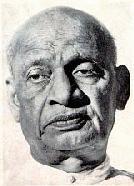|
Patel's nationalism was broad-based. It had no
place for
narrow parochialism of caste and creed
 Fifty years after India won freedom, the myth that Sardar Patel
was anti-Muslim persists. In this fascinating essay, Dr Rafiq Zakaria,
the respected scholar, reveals the truth about Patel
and India's Muslims.
Fifty years after India won freedom, the myth that Sardar Patel
was anti-Muslim persists. In this fascinating essay, Dr Rafiq Zakaria,
the respected scholar, reveals the truth about Patel
and India's Muslims.
Patel, in his reply to Nehru the same day, informed him that
he had instructed Home Secretary H V R Iengar to go ahead with
the appointment of Justice Bashir Ahmed, disregarding Kania's
objection. He said he shared Nehru's view 'of the manner
in which Chief Justice Kania had approached this question. In
fact, I told him on the telephone that any rejection of Justice
Bashir Ahmed at this state could reasonably be regarded as being
based on communal grounds.'
However, Patel cautioned Nehru
against any precipitate action against Kania, who, the Sardar
admitted, 'is even liable to become petty-minded and persist
in his attitude; but, that unfortunately is a trait not uncommon
with some heads of the judiciary, who feel that they have to sole
monopoly of upholding its independence, integrity and purity.'
Nevertheless Patel pointed out to Nehru that 'such indiscretions
on the part of a man in the position of the Chief Justice of India
have to be tolerated. Any other attitude would render us liable
to the charge of interference with the judiciary. After all, asking
Chief Justice Kania to sign does not mean that he would resign.
If he does not, we merely get a rebuff because we cannot carry
out our directions to its logical conclusion, namely, dismiss
him. '
Consequently he requested Nehru 'to allow the
breeze to pass over' which Nehru did and so ended as unfortunate
development which could have had serious repercussions on the
relationship between the executive and the judiciary.
Dr Rammanohar Lohia, the socialist firebrand, in his much discussed
book, Guilty Men of India's Partition, wrote: 'Sardar Patel
was as undoubtedly Hindu in his political motivation as Maulana
Azad was Muslim.' Azad could, however, hide his feelings;
he suffered rather than asserted. Patel was often, as we have
seen, brutally frank; he called a spade, what he though it to
be, a spade. He was transparent in his feelings to a fault. He
did not care if his words hurt. But his patriotism, was beyond
dispute; his nationalism was broad-based. It had no place for
narrow parochialism of caste and creed.
Jayaprakash Narayan had
second thoughts about him; after a lapse of twenty years, the
withdrew his allegation of communal bias against him. He said
his assessment of the man was wrong. Minoo Masani has given a
balanced picture of the Sardar in his book Bliss was it in that
Dawn. He, along with JP and other socialists were in the forefront
in painting Patel as a reactionary and an obscurantist: 'Sardar
Patel did not have a brilliant or scintillating mind, nor was
he a man of great vision. He was not by any standards an intellectual
and suffered from neither the strengths nor the weaknesses of
that species. My friend Yusuf Meherally once said that the only
culture about which the Sardar knew anything was agriculture!
Also, the Sardar had a very harsh tongue. Gandhiji once said that
his tongue is studded with thorns, but he also assured me that
his bark was very much worse than his bite.
'On the other hand,
the Sardar had a big heart under his rough exterior. He was very
loyal to those who worked with him and under him and he was also
a man of his word. He had to do many unpleasant things because,
while Gandhiji laid down the line, it was for the Sardar to give
effect to it.'
Excerpted from Sardar Patel and Indian Muslims, by Rafiq Zakaria, Bharatiya Vidya Bhavan, 1996, Rs 125, with the author's permission. Readers interested in buying a copy of the
book may write to Bharatiya Vidya Bhavan, Kulapati K M Munshi Marg, Bombay 400 007.
|

